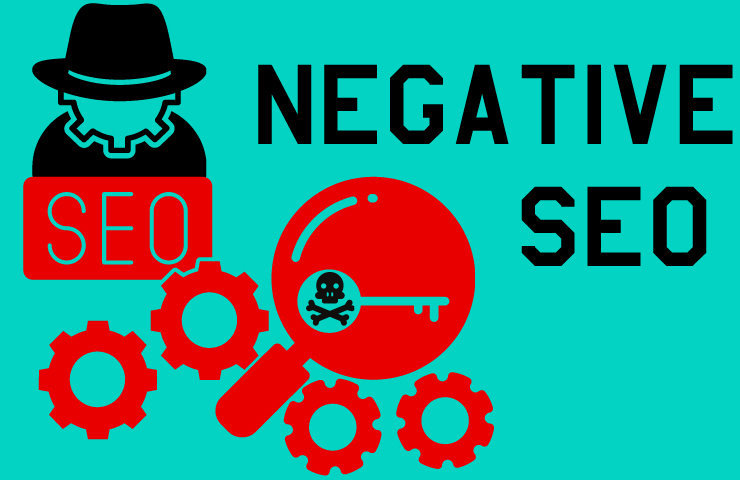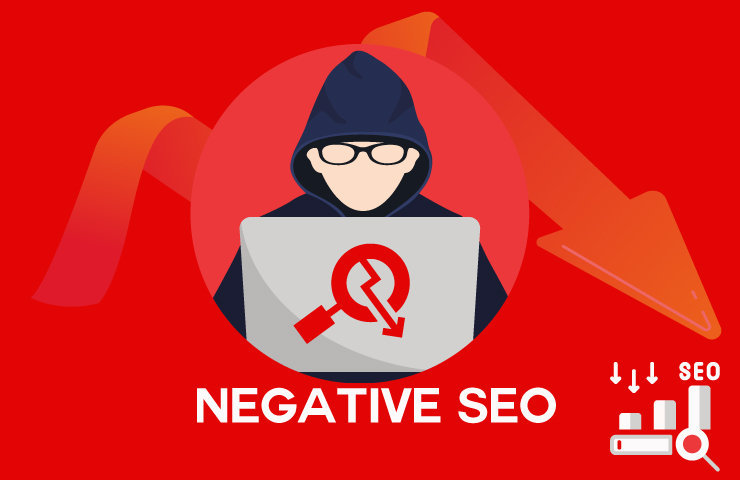Negative SEO
Over the past two decades, the entire SEO industry has undergone a significant transformation. Many online marketers have drastically changed their strategies as a result. As a result, it isn’t easy to rank high on Google for competitive keywords these days.
Black hat SEO is becoming harder and more challenging to do and less likely to produce results. As a result, a new type of SEO called “anti SEO” has emerged.

This guide will help you understand anti SEO and how to protect your business from being a victim. This guide is essential if you want to build your brand online and keep it safe.
What is Negative SEO/ Anti SEO?
Let’s first define Negative SEO:
Anti SEO refers to any malicious technique that aims at lowering search rankings for a competitor’s site. This is known as “black hat SEO” due to its damaging nature.
Anti SEO uses black-hat or unethical methods to undermine a competitor’s ranking in search engines. There are many ways to attack Anti SEO.
- Hacking your website
- Spammy links can be added to hundreds of websites.
- You can copy your Content and distribute it across the internet.
- Use keywords such as Viagra, poker online, and others to point links to your site.
- Fake social profiles created to ruin your online reputation
- Remove the most backlinks from your website
Examples of Negative SEO:
Link Farming :
Pointing low-quality, irrelevant links to your site from websites created for the sole purpose of housing spammy, unrelated links.
Duplicate Content:
Copying and pasting the content of your website and publishing it on other sites is one of the most common ways spammers use to penalize your site.
Modifying Content :
Running invisible scripts from the header and footer templates
Social Media Profiles that are fake:
Negative social media reviews can be damaging. Spammers are known to use social media to attack companies, opening accounts on Facebook and Twitter with the company name and then posting low-quality posts to damage their reputation.
Deindexing the Site:
Changing your robots.txt from the server to get you out of search.
Forceful crawling:
Slowing websites down is a common way for SEO professionals to cause harm. Anti SEO professionals can de-rank or decrease your site’s ranking by forcefully crawling it, taxing the server load, and eventually crashing it.
Click Fraud:
A specially programmed CTR bot searches for the site’s main keywords, branded terms, and clicks on the listing. It then quickly bounces back to the search engine request pages. Google suspects that the site owner is trying to “game” the system, and the site is removed.
Adding Malware to Your Site:
If malware is detected on your site, Google might warn you before forwarding it. Unfortunately, this could cause traffic to plummet.
When Does Negative SEO Happen?
Blackhat SEO is when another company or individual wants to push you down the rankings for a particular keyword. This can happen after you’ve been around for a while or when you start a new business.
Is negative SEO effective?
It’s a good question and the topic of much debate.
Unfortunately, you can damage your site with shady SEO techniques. Therefore, it stands to reason that you could cause similar damage to a competitor site by using the same methods. Google can’t tell which spammy links were created or duplicated Content on hundreds of domains. They can’t if they are clever enough to attack. Blackhat SEO is possible.
Is Negative SEO a Real Threat?
There is no doubt about it. Negative SEO is a real problem, and many websites have had to address it. Unfortunately, it is easier to prevent it than fix it. You can search Fiverr for anti SEO to find more than 15,000 people who are willing to work for $5.
Black hat forums are filled with stories about people who have used this technique successfully. Google’s Disavow Tool has been released to assist web admins in dealing with this issue. However, the tool should only be used as a last resort and with caution.
How Common is Negative SEO?
Google makes it very difficult to do negative SEO. It takes significant time, resources, and the ability to launch an anti SEO campaign against another website.
In this post, Moz’s Dr. Pete provides a detailed review of anti SEO and how likely it will happen. While some of his comments are intended to be funny, he has a point. Attacks against your website aren’t all that common. But, unfortunately, many people mistakenly believe it is an attack.
Anti SEO is often mistaken for many everyday events. According to Dr. Pete, if your overall link profile, which is the total number of links linking to your site from positive to negative, is primarily poor, then some random links could cause it to break beyond repair and lead to a penalty. This may seem like an attack. However, it could be partly your fault.
Google also attempts to make it difficult for anti SEO to be achieved by ignoring “junk” hyperlinks that accumulate over time. Google won’t penalize you for obtaining links from websites you have never met. Google will give less weight to random links the larger you are.
Let’s look at other reasons you might suspect you are under a damaging SEO attack and what you can do to avoid it.
How to Combat Fake Reviews and Social Signals?
Many People Provide Fake social Signals which basically falls in negative SEO services.
- Collect product reviews: Encourage customers to leave reviews about your products and services on Google and other trusted review sites.
- Trustpilot allows you to post customer reviews on your website. There are many options, but TrustPilot is the best. Integrate Trustpilot into your website to send customers emails encouraging them to leave reviews about your products and services.
- Monitor reviewsIt is easy to determine if a review is fake. Bogus reviews can be misleading in many ways. Contact the site owner if you believe that any review left on a website is fake. Although they might not take it down, they might allow you to reply.
- Respond positively to any study, regardless of whether it’s fake or real. Google incorporates reviews into its algorithm. It also shows customers that you are willing to rectify terrible customer experiences.
- Claim social accounts on all popular social platforms: Even if you don’t plan to use them, you need to own your brand on Twitter, Facebook, and YouTube.
- Do not buy fake reviews. Last but not least, do NOT ever think of using a service like Fiverr for reviews. You can post “Google Local Reviews” from more than 100 people, most of whom have not yet purchased your products and services. They are unlikely to live in the same ZIP code as your business.
Identifying a True Case of Negative SEO
It can be challenging to identify a valid case of anti SEO. However, if all three of the above are ruled out and the website is ranking very poorly or has been penalized, then you could be dealing with a case of negative search engine optimization.
Instead of spending time asking “why” or “how” at this stage, prepare to spend all your resources on recovering from the attack. This is the only way to recover your Google rankings and get your traffic back.
What does Google say about Negative SEO?
Google expects everyone to follow the rules. Google Webmaster admitted that anti SEO existed back in 2012, shocking and alarming the online webmaster and marketer community. However, Google Webmaster Matt Cutts has reassured us that while many people talk negatively about SEO, very few do it. “And even fewer, who succeed.” Cutts also stated that anti SEO is a strategy that’s only used in niche markets and highly competitive businesses.
Is Google doing anything about Negative SEO?
Google is doing all kinds of back-end work, but they don’t know what each update does. So the spammers would quickly set about exploiting the new algorithms.
Google’s “link disavow” feature was launched in October 2012. It was Google’s public response to concerns about Damaging SEO. This webmaster tool alerts web admins to manual spam activity and unnatural links and gives them the ability to block backlinks to their website and/or domain. In addition, Google helps you to track fraudulent activity by identifying the root cause and providing a simple text file with URL listings.
The Webmaster Central Blog wants you to be confident in their ability to reward good sites and punish bad ones. They clarified that “the vast majority of websites do not require this tool in any manner.”
Why Negative SEO Attacks Can Be Difficult to Spot and Prove?
It can be challenging to spot and prove a damaging SEO attack, mainly if the website’s backlink profile contains many toxic links or its Content is poor.
Web admins who believe they are victims of anti SEO don’t consider other factors that could lead to a drop in rankings. A Google algorithm update/Core Algorithm update. Google’s algorithmic filtering can filter out your information. These drops can sometimes be mistakenly interpreted As anti SEO. Marie Haynes is a MarieHaynes.com SEO Consultant.
It would help if you did not jump to conclusions about the reason your rankings fell. You should ensure that your Content meets Google’s standards and your backlink profile is maintained to avoid any potential impact from algorithmic updates and algorithmic filtering. Google may find your backlink profile spammy or contain unnatural links, so it is essential to audit your backlinks. Our blog interviews experts to help you understand algorithmic filtering.
Web admins often overlook these factors who immediately conclude that their website has suffered a damaging SEO attack. Your website content must always be engaging, user-oriented, and optimized. Furthermore, backlink profiles should be as trustworthy as possible.
Why the Efficiency of Negative SEO is Arguable?
Google is skeptical that anti SEO, particularly the intentional generation of backlinks from harmful sites, can be effective.
Is it possible to use anti SEO effectively?
It all depends. Google can distinguish between toxic backlinks you have created and those that appear out of the blue. For example, it might be easier to attack a website with little Content and poorly maintained backlink profiles than a website with more Content.
An anti SEO attack can also affect a high-quality website, but it could prove costly and time-consuming for the attacker. To be effective, an attack must be carefully planned and executed with intelligence.
Need More Help Dealing with Negative SEO?
Seolearners is here to help you, whether you are unsure if you are facing an anti SEO attack or are suffering from an unnatural link penalty. Seo Learners can help you identify and fix any issues on your site.
Reach out to our web strategists if you have any questions. We’d love to help you improve your website. We are available by phone or email at any time.
 Global Elix
Global Elix 
